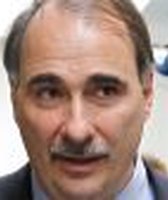Stand up for the facts!
Our only agenda is to publish the truth so you can be an informed participant in democracy.
We need your help.
I would like to contribute
(Published Oct. 13, 2008) In this complex financial crisis, the presidential candidates have the biggest megaphone of all to help us understand the mess we're in.
But relying on them for an unvarnished view is like asking competing trial attorneys to provide the "facts" of a case. You'll get some facts, but in a light that's most friendly to their client.
In the second presidential debate on Oct. 7, 2008, Sens. John McCain and Barack Obama laid out their explanations of the root causes of the financial crisis. Both say they sounded warnings that could have lessened the problem, and both blamed the other for helping to cause it.
Here's the McCain version: "One of the real catalysts, really the match that lit this fire, was Fannie Mae and Freddie Mac. I'll bet you, you may never even have heard of them before this crisis. But you know, they're the ones that, with the encouragement of Sen. Obama and his cronies and his friends in Washington, that went out and made all these risky loans, gave them to people that could never afford to pay back."
Obama's side: "Let's, first of all, understand that the biggest problem in this whole process was the deregulation of the financial system. Sen. McCain, as recently as March, bragged about the fact that he is a deregulator."
In reality, the crisis was caused by a "perfect storm" of economic factors with lots of blame to go around, both in the private sector and government quarters.
In a recent panel discussion on the crisis, Jay Light, dean of the faculty at Harvard Business School, likened it to a train wreck "caused by a collision of a collapsing housing bubble and a new but untested financial system."
Rather than the old system in which a highly regulated bank would buy and hold a person's home mortgage, a system evolved whereby mortgage brokers would originate loans, bundle them, then quickly sell them to Wall Street, where the loans were packaged into securities, cut and sliced, sold and resold.
Role of derivatives
Another factor was subprime loans, which are loans at higher interest rates made to people perceived to be greater lending risks. Elected officials encouraged the relaxation of mortgage standards, motivated by the noble goal of trying to get all Americans into homes — even low- and moderate-income people with poor credit histories. The effort increased the number of home buyers, goosing housing demand.
But investment banks loved what the government was doing and encouraged it. Worldwide savings were soaring, and international investors were hungry for a safe place to park their money.
Mortgage-backed securities appeared to be virtually risk-free on paper, premised as they were on ever-rising home prices. And, once-obscure derivatives — the credit default swap, a private contract that pays off in case of a defaulted loan — were specifically exempted from government regulation. Today, nobody knows the true value of these investments, given foreclosures and mortgage defaults, and that is what's causing the credit crunch — a general reluctance to lend money.
But let's start with McCain's version, with the government agencies called Fannie Mae and Freddie Mac.
Set up decades ago by the federal government to underwrite mortgages and promote home ownership, Fannie Mae (the Federal National Mortgage Association) and Freddie Mac (the Federal Home Loan Mortgage Corp.) became major players in the domestic mortgage market. They don't make loans to homeowners directly, but they purchase mortgages, bundle them into securities, and sell some of them on the open market. Together, Fannie and Freddie owned or guaranteed about $5-trillion in mortgages, about half of the U.S. market.
After years of rapid growth in home prices, foreclosures and mortgage delinquencies began rising by 2006. Some homeowners had adjustable-rate mortgages that were resetting to higher rates they could no longer afford. In other cases, speculators were overextended and dumping properties. Outright fraud had some role: people who took out loans never intending to pay them back.
Regardless of the reasons, by 2008 foreclosures were affecting Fannie and Freddie. The agencies didn't have enough money to meet their financial obligations, and the U.S. government took them over on Sept. 7.
Fannie and Freddie
McCain's statement suggests that Fannie and Freddie made too many risky loans, and that caused today's crisis. Most economists agree that Fannie and Freddie did encourage looser lending standards, but they disagree on whether the agencies were leading the way or following the pack.
There's also McCain's second point, that Democrats encouraged Fannie and Freddie to take on more risky loans.
The answer depends on the point in history you choose to look at. In the late 1990s, the Republican-controlled Congress — with the blessing of Democratic President Bill Clinton — eased the credit requirements on loans that Fannie and Freddie purchased. Fannie and Freddie grew rapidly, and at some point executives started manipulating earnings reports and violating basic accounting principles. Federal investigators uncovered the misconduct, resulting in a scandal.
By 2006, McCain did, in fact, sign on to a Republican-led attempt at regulatory overhaul of the mortgage-financing firms.
"If Congress does not act, American taxpayers will continue to be exposed to the enormous risk that Fannie Mae and Freddie Mac pose to the housing market, the overall financial system, and the economy as a whole," McCain declared in a May 26, 2006, news release.
'Bipartisan problem'
However, McCain's current attempts to depict those efforts as an early warning that could have lessened the current credit crisis don't wash. McCain was talking about potential fallout from accounting troubles, not freewheeling lending standards based on a housing bubble. And he said nothing about major financial institutions becoming badly leveraged on bad loans and new securities products.
While McCain is quick to blame Democrats for opposing the legislation — they did — the Republican-controlled Congress (with a Republican in the White House) didn't get around to a regulatory overhaul when it held power.
"It's a bipartisan problem," said Bill Beach, director of the Center for Data Analysis at the conservative Heritage Foundation.
Obama's argument is that deregulation caused the problem. That's not technically accurate — deregulation implies regulations were done away with. In the case of the economic crisis, there was a bit of that.
The Securities and Exchange Commission, for example, gave an exemption to investment banks in 2004 that allowed them to take on much more debt. But credit default swaps were never regulated in the first place. In 1999, Republicans passed legislation, signed by Clinton, specifically exempting them from regulation.
Some regulatory agencies had regulation powers that they never utilized or didn't utilize well. The Federal Reserve has the power to tighten lending standards, for instance, or raise interest rates. But former Chairman Alan Greenspan discouraged new rules and advised Congress repeatedly not to regulate derivatives.
"There were lots of regulatory failures, and it would be reasonable to blame regulators for not detecting problems and acting on them sooner," said Charles Calomiris, a professor at Columbia Business School and a scholar at the conservative American Enterprise Institute. "But deregulation means the removal of regulatory barriers."
It's certainly fair to say that McCain has historically been an advocate for deregulation of business. In March, as Obama has repeatedly noted, McCain boasted to the Wall Street Journal, "I am fundamentally a deregulator."
But for Obama to suggest McCain's deregulation efforts are to blame for the current financial crisis is misleading. In that same article, McCain said there was a need for government oversight of the subprime lending market.
Lax regulation
Calomiris called Obama's deregulation argument "discouragingly dishonest" as "the only deregulation in banking of any significance (branching deregulation, and allowing commercial banks to underwrite corporate securities) had nothing to do with the subprime crisis. Said differently, everyone (including commercial banks) who underwrote or bought subprime paper would have been able to do so long before deregulation."
But lax regulation contributed to the crisis more than Fannie and Freddie, in the opinion of another economist.
"I put the first blame with the Fed and their failure to rein in the bubble," said Dean Baker, an economist and co-director of the left-leaning Center for Economic and Policy Research in Washington.
Obama did send a letter to Treasury Secretary Henry Paulson and the new Federal Reserve chairman, Ben Bernanke, in March 2007, advising a meeting on the subprime mortgage mess. "We cannot sit on the sidelines while increasing numbers of American families face the risk of losing their homes," Obama wrote.
But economists agree that it was too late by that point, a point that economists Baker and Calomiris agree on. In separate interviews, they both used the same analogy: The horse was already out of the barn.
"The subprime market basically blew up in 2007," Baker said. "It was too late by then."
Our Sources
See individual items for sources.















































